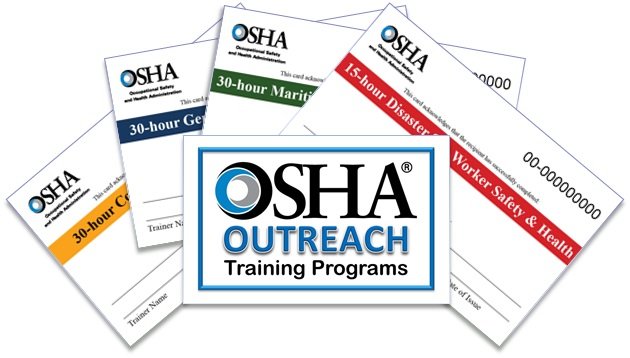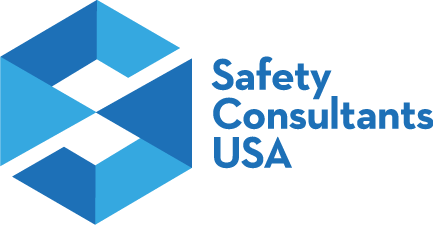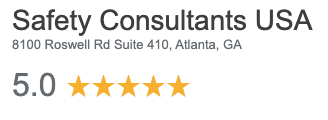OSHA 30-Hour Training Course
What skills should the student expect to learn?
The OSHA 30-Hour Outreach Training Course for Construction or General Industry dives deeper into the contents of OSHA standards and includes safety and health management topics such as safety leadership, injury and illness prevention programs, job site inspections, accident prevention programs, management commitment and employee involvement, worksite analysis, hazard prevention and control, accident investigations, how to conduct safety meetings, and supervisory communication.
All OSHA outreach courses include at least an hour introduction to OSHA which includes how they were established, who they are, what they do, how the inspection process works, penalties and reporting to OSHA.
OSHA 30-Hour for General Industry Topics include:
– Walking and Working Surfaces
– Fall Protection
– Exit Routes and Emergency Action Plans
– Fire Prevention Plan and Fire Protection
– Electrical Safety
– Personal Protective Equipment (PPE)
– Hazard Communication/GHS/Chemical Safety
Electives:
– Hazardous Materials (Flammable and Combustible Liquids, Spray Finishing, Compressed Gases, Dipping and Coating Operations)
– Permit-Required Confined Spaces
– Lockout/Tagout
– Machine Guarding
– Welding, Cutting, and Brazing
– Introduction to Industrial Hygiene
– Bloodborne Pathogens
– Ergonomics
– Powered Industrial Vehicles
OSHA 30-Hour for Construction Topics include:
– Managing Safety & Health
– Falls
– Electrocution
– Struck-by (e.g. falling objects, trucks, cranes)
– Caught-In or Between (e.g. trench hazards, equipment)
– Personal Protective and Lifesaving Equipment
– Health Hazards in Construction
– Stairways and Ladders
Electives:
– Concrete and Masonry Construction
– Confined Space Entry
– Cranes, Derricks, Hoists, Elevators and Conveyors
– Ergonomics
– Excavations
– Fire Protection and Prevention
– Materials Handling, Storage, Use and Disposal
– Motor Vehicles, Mechanized Equipment and Marine Operations; Rollover Protective Structures and Overhead Protection; and Signs, Signals and Barricades
– Powered Industrial Vehicles
– Safety and Health Programs
– Scaffolds
– Steel Erection
– Tools – Hand and Power
– Welding and Cutting
– Foundations for Safety Leadership
Who should take the class?
OSHA 30-Hour courses are geared towards management, supervisors or anyone with safety responsibilities in any industry. The OSHA 30-Hour is a more advanced course that goes more in depth into understanding the standards.
Why choose Safety Consultants USA?
Safety Consultants USA’s instructors combined years of experience, diverse work back grounds, and variety of industries served, makes our instructors uniquely positioned to share their field and training experience with your employees. Safety Consultants USA’s instructors are experienced in partnering with OSHA, investigating incidents, and handling OSHA abatements and mediations. This combined experience allows our instructors to relay real scenarios and probable outcomes. Because our instructors have seen the things that they are teaching they are able to relate to the students and the hazardous situations they may encounter on the job.
Is there a written test for the OSHA 30-Hour for Construction or General Industry?
No. OSHA does not have a requirement for a written exam and it is at the discretion of the instructor. Instructors may use a variety of techniques to confirm information retention.
Does my OSHA 30-Hour Card expire?
OSHA 30-Hour for Construction and OSHA 30-Hour for General Industry cards do not expire. It is recommended that you refresh every 4 years due to changes in OSHA Regulations.
Can the class be customized for my employees?
OSHA Outreach training is structured around a strict outline of topics. Safety Consultants USA’s outreach trainers’ significant experience allows them to tailor the information in the class to the work performed by each client, to the extent allowable by OSHA. Safety Consultants USA is experience in working with clients to choose the electives that will most benefit each client.
The 30-Hour course allows room for a more creative class, tailored to the client’s needs, and to include more interactive materials such as case studies and table top exercises.


